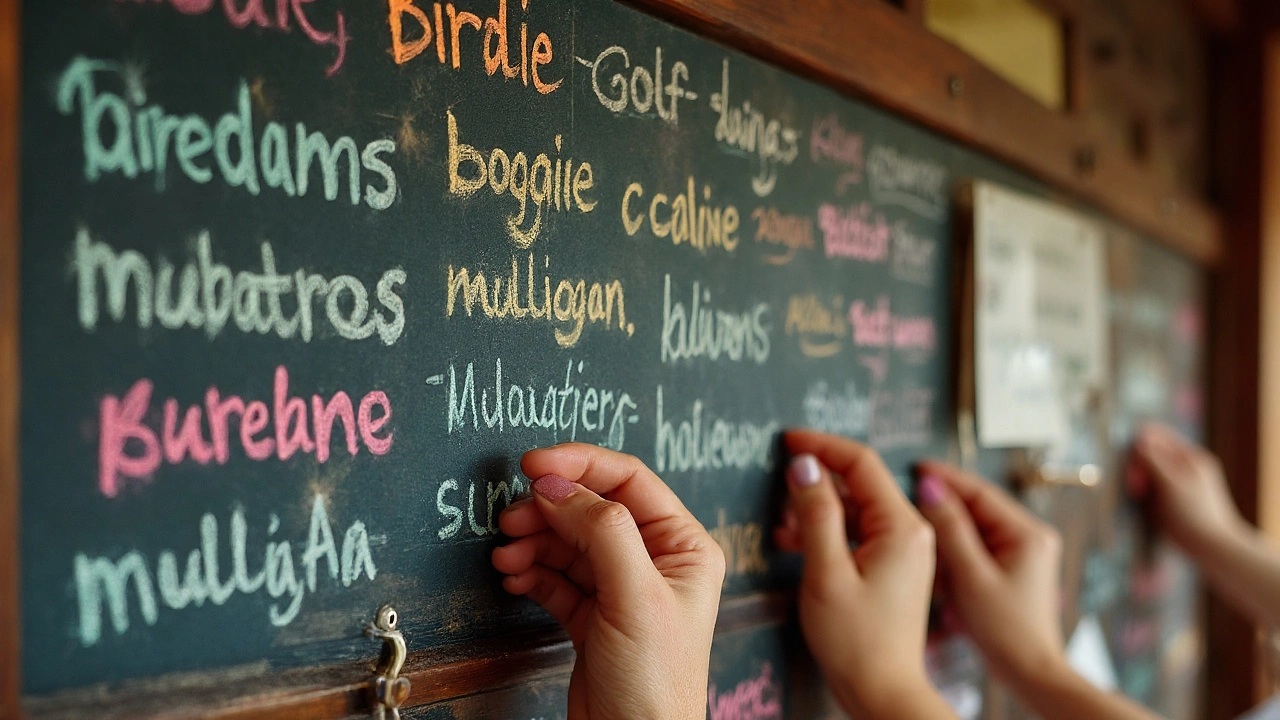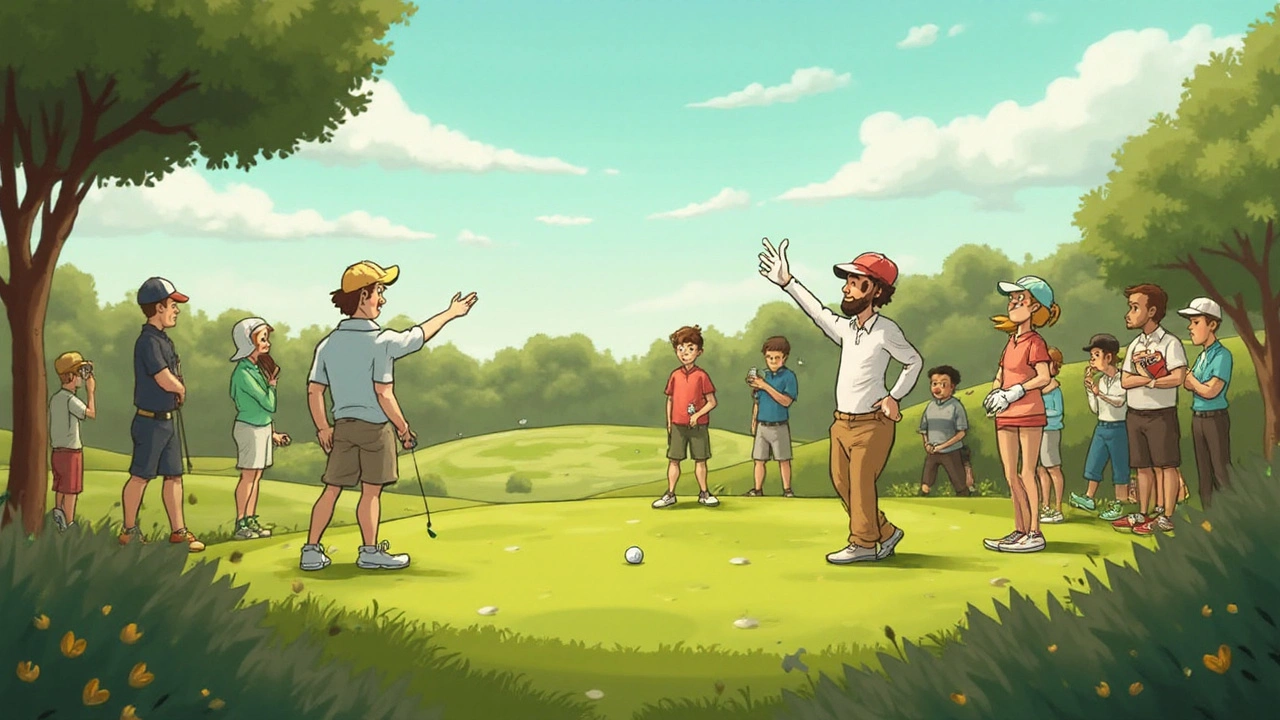Golf Slang Explained: Top Terms Every Golfer Should Know

Ever heard a golfer shout about hitting a “worm burner” or complain they “choked” on the green? The language of golf can feel like it belongs on a different planet—one mixed with old-timey expressions, weird animal references, and very specific in-jokes. But once you get the hang of it, the slang makes any round more fun (even if you’re just caddying or watching the game). Stick around and you’ll be decoding clubhouse banter in no time.
Why Golf Has Its Own Secret Language
Golf isn’t just old; it’s ancient. The roots go back to 15th-century Scotland, and you can bet the first players were already tossing around inside jokes and creative names for tricky situations. Over the years, the game’s calm pace and quirky situations meant players had plenty of time to poke fun, invent new phrases, and turn mistakes into punchlines. That’s why golfing jargon is so rich and varied.
Some slang dates back generations, passed around on the links like stories by a campfire. Newer terms catch on thanks to TV broadcasts, viral highlight reels, or just a clever phrase shouted loud enough to make the group laugh. The pros love using their own versions, and you’ll even hear casual weekend golfers adapting the lingo for their home courses. It’s a language that keeps evolving, making every round a little more colorful—and maybe giving you a sense of belonging before you’ve even sunk your first putt.
People use golfing slang to have fun, poke fun at themselves or their buddies, and sometimes to soften the sting of a really bad shot (of which there are always plenty). You’ll find specific words for disasters (“shank”), miracles (“ace”), and everything in between. Learning the lingo makes it easier to fit in, follow the action, and—if you’re sneaky—impress someone new to the sport.
Watching professional tournaments, you may have spotted caddies or commentators throwing out terms that never show up in the rulebook. A big reason is that golf lends itself to nicknames for both the best and worst outcomes. Unlike more rigid sports, there’s room to laugh about your mistakes and add drama to your victories, all with just the right word or phrase.
Here’s what stands out: Golf slang isn’t just old Scottish sayings. American players, Aussies, South Africans, and even Japanese golf fans have all contributed to a global dictionary of golf humor and shorthand. You’ll notice a Scottish accent in some phrases, a slice of baseball or poker terms in others—all mashed together for maximum fun in the fairway.
Popular Golf Slang Terms—And What They Mean
If you’re looking to talk the talk, start with the classics. The basics are famous for a reason—they capture the drama, the agony, and the unexpected wins in just a word or two. Here are the essentials, broken down with examples that actually show up on the course.
- Birdie: It means you shot one stroke under par. If the hole says it’s a four and you get it in three, you just scored a birdie. Credit repeats in golf jokes everywhere.
- Eagle: Even better! Two strokes under par on a hole. Eagles don’t come easy, so you’ll hear this word celebrated loudly.
- Bogey: The opposite—a score of one over par. Mess up a short putt? That’s a bogey coming your way.
- Double Bogey: Two over par. Welcome to the bad times.
- Par: The expected score for a hole. Hitting par is like getting a solid “B+”.
- Ace: That rare, mythical hole-in-one. Every golfer dreams of shouting about their first ace.
- Mulligan: An unofficial do-over for a bad shot, mostly in friendly rounds. Official tournaments won’t give them out, but your Saturday group might.
- Fore!: A warning yell if you hit a wild shot that could land near other people. Shout it loud!
- Shank: The dreaded shot that slices way off course, usually off the club’s hosel (the part where the shaft meets the head).
- Slice/Hook: Slice sends the ball far to the right (if you’re right-handed), hook sends it left. Both usually not what you want.
- Sandbagger: Someone who pretends they’re worse than they are, so they get extra strokes in handicap matches—and then crushes everyone.
Here are some more colorful ones you’ll definitely overhear at your local course:
- Worm Burner: A shot that barely gets off the ground—spooked worms everywhere.
- Snowman: Scoring an eight on a hole (it looks like a snowman on the card). Not a good thing.
- Breakfast Ball: A first-hole mulligan—because your warmup on the range obviously didn’t count.
- Stymie: Originally described a ball blocking another on the green in old-school matchplay; now, any tricky obstacle.
- Yips: Those nervous shakes that make you miss short putts—ask anyone who’s lost a friendly wager because of them.
- Chili Dip: Hitting behind the ball so badly you chunk a huge divot and barely move it forward.
- Beach: The sand bunker. “I’m headed to the beach!” probably means trouble, not vacation.
- Pin Seeker: A shot heading right at the flagstick.
- Fat/Thin: “Fat” means hitting the ground before you hit the ball; “thin,” the opposite—blading it and sending it too low.
Notice all the humor? Even in disaster (“snowman,” “chili dip”), golfers keep it fun and never let things get too serious. That’s why this slang survives through decades—and gets new entries every year.

Classic Origins: Where Golf Slang Comes From
The roots of golf slang can be traced back to the earliest Scottish players taking their clubs out onto the windswept links. They invented some of the original golf words—like “caddie” and “links”—and their sense of humor shaped how people talked about the sport.
Many of the most famous golf slang words started off as in-jokes or creative ways to poke fun at the misery and magic of the game. The word “birdie” actually came from American slang in the early 20th century—“bird” was cool, so scoring one under par was a “bird of a shot.” When a golfer in Atlantic City hit a great shot in 1903 and called it a “birdie,” his friends started using it, and it just caught on.
“Mulligan” stands out as one of those terms that everyone knows but no one can source with 100% certainty. Theories suggest it came from a Canadian golfer named David Mulligan, who gave himself re-dos after bad shots. Another rumor ties it to a bar in New York where extra chances were called “mulligans.” Either way, it’s totally unofficial and 100% beloved in weekend games everywhere.
“Bogey” came from a song! In the late 19th century, “The Bogey Man” was a British tune, and golfers called their imaginary opponent “Colonel Bogey.” To play against “bogey” meant trying to play to the standard score for the hole—not quite par. Over time, “bogey” morphed into what we now use as a word for one over par.
Some of the wilder terms—like “snowman” or “chili dip”—are pure modern invention, spread by word of mouth and immortalized in golf magazines or broadcasts. TV commentators love a good nickname for a disaster or miracle, and if enough people laugh or groan, the word sticks. The best part? There’s no golf slang police. Play at a new course and you might hear some homemade phrases, especially among friends who keep score with a wink and a nudge.
The international nature of golf also sprinkles in fun twists. Australians use “wind cheater” for a low shot that carves under the breeze, and you’ll hear British players refer to the “brolly” (umbrella) when clouds roll in. The vocabulary is as cosmopolitan as the game itself.
Every era of golf brings its own slang, shaped by technology, culture, and hilarious mishaps. Now with YouTube and TikTok, a great joke about someone’s disaster drive can go global in hours—and add yet another catchphrase to the mix.
Golf Slang in Action: Practical Examples and Table
It’s one thing to learn what a golf phrase means; it’s another to use it at the right time. Here are examples of classic golf slang in context—plus a table for easy reference, so you can glance at it before tee-off and be ready for anything.
- Your buddy misses a putt from three feet: “Oof, the yips got you on that one!”
- You smack the ball and send it skimming across the ground: “That’s a worm burner if I ever saw one.”
- Hitting way off to the right: “That’s a mean slice. Watch out, trees.”
- Landing right in the sand trap: “Beach vacation, but not the relaxing kind.”
- Your first drive goes well—after a messy warmup: “Breakfast ball for the win!”
- Everyone’s groaning as you card an eight: “I just made a snowman. Yikes.”
| Term | Meaning | Example in Use |
|---|---|---|
| Birdie | One under par for a hole | “She nailed a birdie on the sixth.” |
| Bogey | One over par for a hole | “Another bogey, keep it moving.” |
| Mulligan | A do-over, usually the first shot | “Taking a mulligan, that one doesn’t count.” |
| Sandbagger | Player under-reporting skill | “Watch out for him, he’s a sandbagger.” |
| Fore! | Shouted warning before an errant shot | “FORE! Heads up!” |
| Snowman | Score of eight on a hole | “I left the snowmen for winter, thanks.” |
| Worm Burner | Low, skimming shot | “I just hit the world’s best worm burner.” |
| Yips | Sudden putting nerves | “Short putts and the yips, my nemesis.” |
Keep the table handy or snap a photo before you head out. Next time you’re in a golf group, throw a few of these out—you’ll earn some grins (and maybe a drink after the round).

How to Use Golf Slang Like a Pro (Without Sounding Like a Try-Hard)
There’s an art to using golf slang. Drop “chili dip” at the right moment and you’ll sound like you’ve been golfing for years. But use too many at once and you run the risk of sounding like you memorized a script before hitting the links.
Start by listening to the group. Every foursome has favorite sayings, and local courses love their homegrown versions. Hear someone joke about a “Texas wedge” (putting from off the green)? Try it out when you leave the pitching wedge in the bag. Not sure what a phrase means? Ask. Most golfers are happy to teach a newcomer—and usually, the explanation comes with a funny story attached.
Don’t just learn the words; pay attention to context. For example, a “mulligan” is rarely OK in tournament play, but in a weekend scramble, everyone’s expecting at least one. Jokes about “making a snowman” after a triple bogey will get a laugh—especially if you’re laughing at your own struggles, not at others.
If you want to add flavor, try inventing your own local slang. Got a buddy who always seems to find water hazards? Call it a “fish fry” or a “scuba shot.” Local color makes games feel special and gives your group inside jokes you’ll remember long after the round ends.
- Avoid jargon overload—one or two slang terms per hole is plenty for new players.
- Focus on light-hearted words; golf already has enough pressure.
- Remember: It’s fine to poke fun but never use slang to mock or embarrass other golfers. Keep things friendly.
- Be ready for regional differences; what’s funny at your club may get strange looks elsewhere.
- Use the most important seo keyword—golf slang—naturally in conversation or when describing a wild shot.
There’s nothing like a shared laugh over a failed “pin seeker” or a heroic “eagle” to bring a group together. And once the round is done, you’re not just swapping stories—you’re fluent, even if you don’t always hit par.
